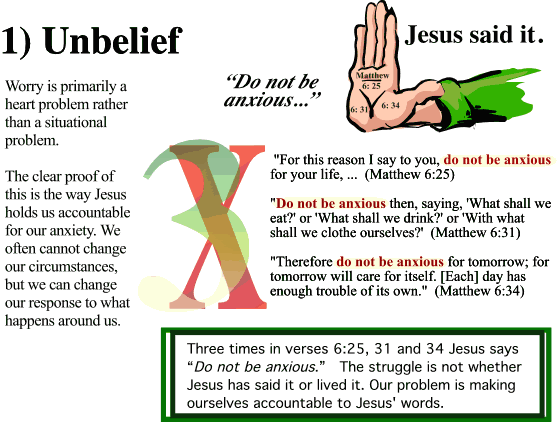|
JESUS SAID IT
"For this reason I say to you, do not be anxious for your life, ... (Matthew 6:25)
"Do not be anxious then, saying, 'What shall we eat?' or 'What shall we drink?' or 'With what shall we clothe ourselves?' (Matthew 6:31)
"Therefore do not be anxious for tomorrow; for tomorrow will care for itself. [Each] day has enough trouble of its own." (Matthew 6:34)
Williams NT translation below
"So I tell you, stop worrying about your life ...." (Matthew 6:25)
"So never worry and say, What are we going to have to eat?' or What are we going to have to drink? What are we going to have to wear?" (Matthew 6:31)
"So never worry about tomorrow; for tomorrow will have worries of its own. Each day has evil enough of its own." (Matthew 6:34, )
|
 During the Sermon on the Mount Jesus _________ times said, "Do not be anxious."
During the Sermon on the Mount Jesus _________ times said, "Do not be anxious." When we understand the impact of Jesus' words, we are greatly humbled. We instantly think of how many times we have gone against His command on not worrying. We have tolerated the existence of worry.
 Jesus' command brings the fight with anxiety back into the ring. All of a sudden we become responsible to deal anxiety a decisive blow. We usually cannot change our circumstances, but we can change our response to what happens around us.
Jesus' command brings the fight with anxiety back into the ring. All of a sudden we become responsible to deal anxiety a decisive blow. We usually cannot change our circumstances, but we can change our response to what happens around us.
Unbelief in God's Word will always hold us back from obtaining God's perfect design. Some people think God uses His commands to keep the best things of life from us. In fact, God's commands lead us to the perfect peace that He has promised. Trust (belief) and obedience is inextricably linked up to each other.
The command not to be anxious will elicit one of two responses.
Either we will ignore Jesus' words
We might respond by saying to ourselves that Jesus did not mean what He so clearly stated.
Or obey Jesus' words
We will humble our hearts and admit that we have disobeyed Him. Seeking God for extra help will follow a time of repentance.
 Once you have acknowledged your worries, then you need to confess your sin of anxiousness to the Lord. I know some of you will say,
Once you have acknowledged your worries, then you need to confess your sin of anxiousness to the Lord. I know some of you will say,
"But I can't help but worry!"
That might be an okay beginning, but you must not stop there. If you stop there, then you will make yourself not unaccountable for your actions. Here is what you will sound like if you do not confess your sin of worry.
"Jesus, I know what you said, but I am different. I tried, but somehow You made a miscalculation regarding my life. I am going to keep worrying because your commands don't apply to my life."
Start with agreeing that you have failed to obey Him. Instead of saying you can't help it, confess your unbelief that you before did not even believe you could obey Him on your own. In this way, you admit your weakness of unbelief rather than excuse yourself from Jesus' command. Here is a prayer you might lift up before God.
Dear Father in Heaven, I have failed you again. All my life I thought worry was just part of life. I see now how clearly Jesus has told me not to worry. I knew the scriptures but was somehow blind to them. I am so sorry for treating your word so shabbily. Please forgive me. I seek your grace to be changed. I cannot cross the bridge on my own. Somehow you need to help me stop worrying. In Christ's Name I pray, Amen.
 During the Sermon on the Mount Jesus _________ times said, "Do not be anxious." When we understand the impact of Jesus' words, we are greatly humbled. We instantly think of how many times we have gone against His command on not worrying. We have tolerated the existence of worry.
During the Sermon on the Mount Jesus _________ times said, "Do not be anxious." When we understand the impact of Jesus' words, we are greatly humbled. We instantly think of how many times we have gone against His command on not worrying. We have tolerated the existence of worry.




